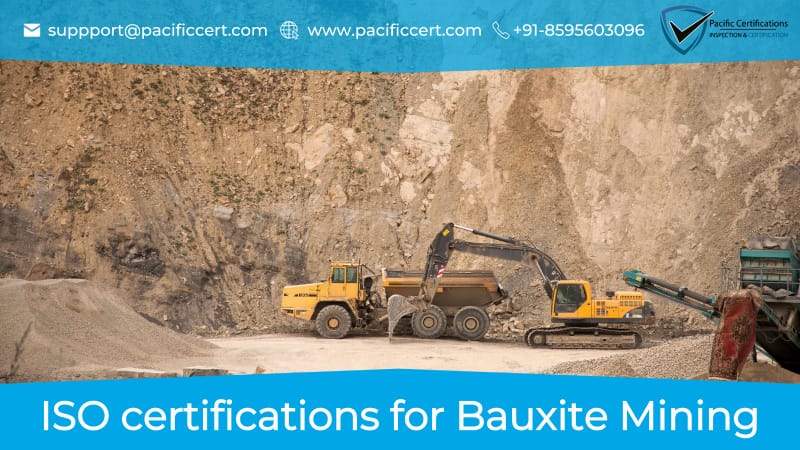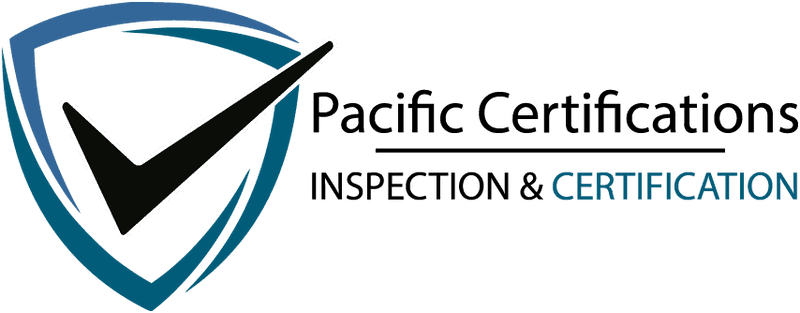ISO Certifications for Bauxite Mining, Requirements and Benefits

Introduction
Bauxite mining operations involve large-scale open-pit extraction, ore crushing, screening, conveyor transportation, and stockpiling activities in challenging environmental conditions. Mining contractors face constant exposure to occupational hazards including equipment failures, dust exposure, ground instability, and heavy machinery accidents while managing overburden removal and ore processing operations. These businesses must balance production efficiency with strict environmental protection, worker safety protocols, land rehabilitation obligations, and community engagement responsibilities.
ISO certifications provide bauxite mining operators, extraction contractors, and processing facilities with internationally recognized management frameworks to address environmental impacts, workplace hazards, regulatory compliance requirements, and operational quality standards. Mining companies face mounting pressure from environmental protection agencies, mining safety authorities, IFC Performance Standards, and the Equator Principles to demonstrate measurable improvements in sustainability performance and risk management.
Safety and environmental stewardship define operational excellence in mineral extraction.
Quick Summary
ISO certifications provide bauxite mining with internationally recognized frameworks to manage quality through ISO 9001, occupational health and safety through ISO 45001, environmental impacts through ISO 14001, energy efficiency through ISO 50001, asset reliability through ISO 55001, risk management through ISO 31000, business continuity through ISO 22301, and information security through ISO/IEC 27001.
For more information on how we can assist your bauxite mining business with ISO certifications, contact us at [email protected]
Applicable ISO Standards for Bauxite Mining Businesses
Below are the most relevant ISO standards applicable to bauxite mining operators, ore extraction contractors, processing facilities, and mining service providers:
Applicable ISO Standards
ISO 9001:2015 (Quality Management System)
ISO 9001 establishes quality controls across bauxite extraction, crushing, screening, and stockpiling processes to ensure consistent ore quality, customer satisfaction, and operational efficiency. This standard helps mining operators document procedures, manage supplier quality, control non-conforming material, and drive continuous improvement in extraction operations.
ISO 14001:2015 (Environmental Management System)
ISO 14001 addresses bauxite mining's significant environmental footprint including land disturbance, habitat destruction, water pollution, dust emissions, and resource depletion through systematic environmental impact management. Implementation enables mining operators to monitor environmental performance, ensure regulatory compliance, implement pollution prevention measures, and fulfill land rehabilitation obligations required by environmental authorities.
ISO 45001:2018 (Occupational Health and Safety Management System)
ISO 45001 is critical for bauxite mining due to inherent workplace hazards including heavy machinery operation, blasting activities, dust exposure, ground instability, and equipment failures that pose constant risks to mining personnel. This standard establishes systematic hazard identification, risk assessment, and control implementation to reduce workplace incidents and create safer extraction environments.
ISO 55001:2014 – Asset Management Systems
ISO 55001 optimizes lifecycle management of critical mining assets including excavators, haul trucks, crushers, conveyors, and processing equipment to maximize reliability and minimize costly downtime. This standard enables mining operators to implement predictive maintenance, extend equipment lifespan, and improve asset performance in demanding extraction environments.
ISO 50001:2018 (Energy Management System)
ISO 50001 helps energy-intensive bauxite mining operations reduce fuel consumption in heavy machinery, optimize crushing and processing energy use, and lower operational costs through systematic energy performance improvement. Implementation supports mining companies in measuring energy consumption, setting reduction targets, and enhancing overall energy efficiency across extraction and processing operations.
ISO 31000:2018 – Risk Management
ISO 31000 provides bauxite mining operations with a structured approach to identify, assess, and mitigate operational risks including safety incidents, environmental accidents, equipment failures, regulatory non-compliance, and commodity price fluctuations. This framework enables mining operators to make informed decisions, protect workers, and ensure operational resilience in high-risk extraction environments.
Click here to find out more applicable standards to your industry
What are the Requirements of ISO Certifications for Bauxite Mining Businesses?
Bauxite mining operators seeking ISO certification must establish and maintain documented policies, procedures, and records aligned with the selected ISO standards. Key requirements include the following:
ISO 45001:2018 – Occupational Health and Safety Management Systems
Establish occupational health and safety policy addressing mining-specific hazards including blasting, heavy machinery, dust exposure, and ground stability
Identify workplace hazards through systematic risk assessments of extraction areas, haul roads, crushing facilities, and maintenance operations
Implement control measures for high-risk activities including lockout/tagout procedures, confined space protocols, and personal protective equipment requirements
Ensure worker participation through safety committees, hazard reporting systems, and consultation on operational changes affecting safety
Monitor occupational health metrics including injury rates, near-miss incidents, dust exposure levels, and noise measurements
Conduct regular safety audits of mining equipment, extraction sites, and operational procedures to verify compliance
ISO 14001:2015 – Environmental Management Systems
Develop environmental policy aligned with land rehabilitation, water protection, air quality, and biodiversity conservation obligations
Identify environmental aspects including land disturbance, water discharge, dust emissions, noise pollution, and habitat impacts from mining activities
Ensure compliance with environmental permits, mining regulations, IFC Performance Standards, and local authority requirements
Set measurable environmental objectives for emissions reduction, water conservation, waste minimization, and progressive rehabilitation
Monitor environmental performance through air quality testing, water sampling, noise measurements, and biodiversity assessments
Implement corrective actions for environmental incidents and drive continuous improvement in sustainability performance
ISO 9001:2015 – Quality Management Systems
Define quality policy and objectives for ore extraction consistency, crushing specifications, and customer satisfaction
Control mining processes through documented procedures for drilling, blasting, excavation, hauling, and ore processing operations
Manage supplier quality for explosives, fuel, spare parts, and contracted services critical to mining operations
Maintain records demonstrating ore quality, equipment calibration, process controls, and customer delivery performance
ISO 55001:2014 – Asset Management Systems
Establish asset management policy covering excavators, haul trucks, crushers, conveyors, and critical mining infrastructure
Implement lifecycle planning for equipment acquisition, operation, maintenance, and replacement decisions
Define maintenance strategies including preventive schedules, condition monitoring, and failure analysis for heavy mining equipment
Monitor asset performance through availability metrics, downtime tracking, and maintenance cost analysis
ISO 50001:2018 – Energy Management Systems
Develop energy policy targeting fuel consumption reduction in mobile equipment and processing operations
Identify significant energy uses in hauling, crushing, pumping, and site infrastructure
Establish energy performance indicators and improvement targets for mining operations
Implement energy-efficient practices in equipment operation, route optimization, and process controls
Tip: Start by conducting a gap analysis of current mining operations against ISO requirements, focusing first on critical safety and environmental risks. Engage frontline mining personnel in developing practical procedures that reflect actual extraction, processing, and maintenance activities rather than generic documentation.
For more information on how we can assist your bauxite mining business with ISO certifications, contact us at [email protected]
What are the Benefits of ISO Certifications for Bauxite Mining Businesses?
ISO certifications provide bauxite mining with strong operational and commercial advantages, enabling operators to demonstrate commitment to safety, environmental stewardship, and quality while meeting stakeholder expectations, listed below are the key benefits for the ISO standards applicable to bauxite mining operators, ore extraction contractors, processing facilities, and mining service providers:
Improved worker safety through systematic hazard identification, risk controls, and reduced incident rates in high-risk mining environments
Stronger environmental performance with measurable reductions in pollution, effective land rehabilitation, and minimized ecological impact
Better regulatory compliance reducing risk of fines, permit suspensions, and operational shutdowns from environmental or safety violations
Enhanced operational efficiency through optimized extraction processes, reduced waste, and improved resource utilization
Greater stakeholder confidence from investors, communities, regulators, and customers requiring demonstrated sustainability commitments
Higher competitiveness in securing contracts with aluminum producers and international buyers requiring certified suppliers
Reduced operational risks through systematic risk management, business continuity planning, and crisis response capabilities
Lower energy costs from improved fuel efficiency in mobile equipment and optimized processing operations
Improved asset reliability with extended equipment lifespan, reduced downtime, and optimized maintenance performance
Strengthened reputation as a responsible mining operator committed to international best practices and sustainable development
The global bauxite mining market reached USD 20.27 billion recently and is projected to exceed USD 29 billion in the coming years, driven by sustained aluminum demand from electric vehicles, renewable energy infrastructure, and construction sectors. Environmental protection agencies and mining safety authorities are imposing stricter regulations on extraction operations, requiring systematic environmental monitoring, progressive land rehabilitation, and enhanced worker protection measures.
ISO implementation in mining operations has demonstrated 20-30% reductions in workplace incidents, measurable improvements in environmental compliance, and enhanced operational efficiency. ISO certification is becoming a baseline requirement for bauxite suppliers entering global aluminum supply chains, with major producers increasingly requiring certified contractors and partners to demonstrate commitment to quality, safety, and sustainability standards.
How Pacific Certifications Can Help
Pacific Certifications, accredited by ABIS, acts as an independent certification body for bauxite mining businesses by conducting impartial audits against applicable ISO standards. Our role is to objectively assess whether documented management systems and mining operational practices conform to international ISO requirements, based strictly on verifiable evidence and operational records.
We support bauxite mining providers through:
Independent certification audits conducted in accordance with ISO/IEC 17021
Practical assessment of real mining extraction, processing, safety, and environmental controls
Clear audit reporting reflecting conformity status and certification decisions
Internationally recognized ISO certification upon successful compliance
Surveillance and recertification audits to maintain certification validity
Objective evaluation of management systems across multiple mining sites and facilities
Contact Us
If you need more support with ISO certifications for your bauxite mining business, contact us at [email protected] or +91-8595603096.
Author: Ashish
Read More at: Blogs by Pacific Certifications

